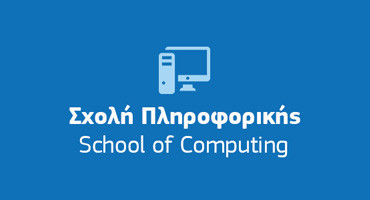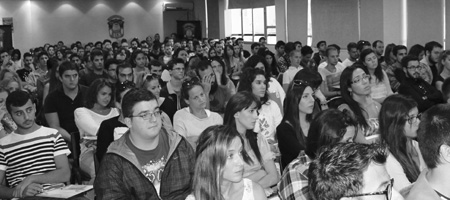





MSc Big Data Analytics
-
No1 in Greece | TOP30 in the UK.
-
Business intelligence, data analytics & database technology.
-
Harness the full power of SAS software.
-
Practice in High Performance Computing Labs.

Big Data is around us!
MSc Big Data Analytics is a postgraduate degree offered by Mediterranean College, a highly specialised provider in Computer Networks & Security studies.
It focuses on the extraction, analysis, exploitation and management of information from big data, using a variety of scientific techniques and software tools. Check out students’ testimonials and learn more about the programme.
SCHOOL OF COMPUTING
Course Information
The MSc Big Data Analytics is a perfectly structured programme that equips students with both the theoretical grounding and the practical skills concerning a broad range of topics related to Big Data Analytics.
Big data is around us. Every day 2.5 quintillion (2,500 followed by 15 zeros) bytes of data are created, and 90% of the data in the world today has been generated in the last two years. As a consequence, skills in processing and obtaining intelligence from the precious commodity of big data are in demand across many sectors, ranking data scientist as the best job in America according to Glassdoors 2018 rankings and for three years running.
The main focus of the programme is the extraction, analysis, exploitation and management of information from big data, using a variety of scientific techniques and software tools. A key aspect of the programme is that its structure and learning outcomes are designed in conjunction with SAS, the global leaders in data analytics, whose data mining and business intelligence platform is widely used in academia and industry.
The programme is designed for graduates in a STEM or Business subject, who want to gain the necessary background in Big Data Analytics, but also for data analysis professionals who want to expand their knowledge and skills in this specific discipline. Thus, this specific programme provides exciting career opportunities in academia or industry.
The programme addresses:
- Graduates of Higher Education Institutions, Colleges or overseas Universities in a Computing or Science, Technology, Engineering, Mathematics (STEM) discipline.
- Graduates of Higher Education Institutions, Colleges or overseas Universities in a Business discipline.
- Also, graduates of theoretical sciences (social sciences, humanities) or health sciences may be admitted to the program conditionally and upon successful completion of a bridging course offered by the School of Computing.
Requirements for registration:
- Copy of the last studies certificate *
- CV (in English)
- Reference Letters (2)
- Good knowledge of English (IELTS 6.5 level or equivalent) **
- Academic interview
- Photos (2)
- Copy of ID-card/ passport
* Candidates without a first degree in computing are also encouraged to apply for the programme. Factors such as the possession of a degree in other disciplines or other professional qualifications, proven experience in computing, and commitment to continuing personal & professional development may contribute to the admission to the programme.
** Candidates without official English language certificates can sit the English language placement test of Mediterranean College.
The programme is studied within 2 years in a part-time basis and comprises of six 20-credit modules and a diploma thesis of 60 credits. A key aspect of the programme is that its structure and learning outcomes are designed in conjunction with SAS Analytics. The whole programme is brought together by an in-depth project through the Independent Scholarship module in an area of your choice, which may be focused on your current role if you are studying part time, or in an area where you see your career developing.
|
Year 1 |
Year 2 |
||
|
Semester 1 |
Semester 2 |
Semester 3 |
Semester 4 |
| Studying at Masters Level and Research Methods | Business Analytics | Processing Big Data | Independent Scholarship |
| Statistical Techniques | Analytics: ethics, trust and governance | Information Visualization | |
Part-time structure
You will learn through lectures, tutorials, seminars, discussion groups, practical sessions, presentations and blended learning. You will gain theoretical and practical skills using the specialized analytics tools of SAS, and analytics-oriented programming languages, like R and Python.
You will be assessed by a mixture of coursework and examinations. There will be a range of coursework options including analytical essays, technical reports, research papers, case studies, multi-task portfolios and presentations.
An essential part of the programme is the final project (Independent Scholarship), in which students can produce high-level research on a particular topic of their interest, under the supervision of an experienced tutor, which can lead to publications in conference proceedings or scientific journals.
The learning experience is further enriched through the activities of the School of Computing.
In order that School of Computing stays at the forefront in the rapidly evolving fields of Computer Games Development and Big Data Analytics, we make it a priority to keep up to date with the latest developments in hardware. This includes that students work with more exotic hardware that cannot be found in typical computer labs.
There is now a dedicated lab, the ”High Performance Computing (HPC) Lab”, set up for the high computing demands of real-time graphics applications & games development, and big data processing & deep learning.
HPC Lab – Hardware:
Ι7-8700, 6 cores /12 threads, 3.2 ~ 4.6 GHz boost freq.
16GB RAM,
NVIDIA GeForce GTX 1080, 2560 cores, 8 GB
Dual monitors (20” 1920×1080)
- It is one out of few postgraduate programmes in Greece on advanced studies in data science and it stands out because it is focused on the extraction, analysis, exploitation, and management of information from both business and scientific data, thus creating well-rounded professionals.
- The programme structure and its learning outcomes are designed in conjunction with SAS, thus students gain theoretical and practical skills using the specialized analytics tools of SAS, and analytics oriented programming languages, like R and Python.
- Students are assessed through professionally oriented methods, including analytical essays, technical reports, research papers, case studies, multi-task portfolios and presentations.
- Students pursue high-level research on a particular topic of their interest, under the supervision of an experienced tutor, which can lead to publications in conference proceedings or scientific journals.
- Academic staff are all active scholars and/or industry professionals with substantial experience in computer science and are also accredited lecturers of the University of Derby for every module they teach, and registered at the Ministry of Education’s College Tutors Registry. Mediterranean College implements an integrated system of recruitment, assessment and continuing professional development of academic staff, so that students receive excellent teaching and personal support to develop their social and professional skills.
- Mediterranean College places particular emphasis on the academic support of undergraduate students: students receive regular feedback on their academic progress; students have full access to the College’s libraries and electronic resources, whilst the educational processes are fully supported by the Mediterranean College’s e-class (link to mc-class).
- Mediterranean College has developed an integrated Employability plan, the MC Employability Scheme, focused on the contemporary needs of our Computing students: career counseling and professional development, regular guest lectures, real projects, seminars, networking events, employability fair, and internship scheme.
- The University of Derby (Guardian University Guide 2020) is a TOP-26 UK University, having the 1st place among the UK Universities that are affiliated in Greece; it is in the TOP-10 for student employability and is rated Gold in the Teaching Excellence Framework (TEF). This stems from constantly developing the curriculum as directed by employers, professional, and accreditation bodies.
Graduates of the programme, according to Greek legislation, are holders of an accredited master’s degree, professionally equivalent to those awarded by Greek State Higher Education Institutions. If they wish so, they can have their degree recognised by the Greek authorities. Click here for more information on the degree recognition procedure.
Graduates have excellent employment and earnings potential as prospects include working in many areas of computing and information technology, particularly in the areas of data analytics, business intelligence, information management, and visualization, having an in-depth knowledge and critical understanding of the key issues and concepts in today’s data-driven business and science landscapes. Alternatively, they may undertake further research leading to a PhD.
Testimonials
The 3 years I studied at Mediterranean College, I had the opportunity to further my knowledge and develop a range of personal and professional skills. I also learned how to work as a team to accomplish our goals. All the academic and administrative staff were really supportive and helpful....
Georgios Choutsisvilli, BSc (Hons) Computer Science.
Studying at the University of Derby was an interesting experience, the level of studies is really good but most of all we met people that we became good friends with. I wish all the best for their life and career....
Dimitrios Pozaritis, BSc (Hons) Computer Science
My time at the College was great. I made some great friends there who helped me overcome many problems. I learned a lot from my time there and I want to thank my teachers for supporting me throughout these three years....
Christos Avgerinos, BSc (Hons) Computer Science




